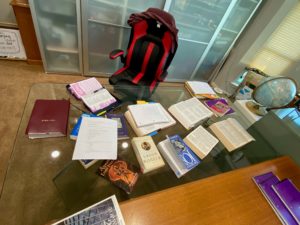Put your tray tables in their upright positions is the title of the next chapter in the book and something we heard over the weekend as we flew on a plane for the first time in a while. I have heard it a few times in my life. Generally speaking, I don’t really like to hear the same thing again, but somethings need repeating. Sometimes I feel as if my blogs are repetitive, but in the end, I like the old math phrase, “Drill and Kill.”
The chapter starts with a quote from a room mate who told the author to put everything up after each task, so your desk is clear for the next project. Supposedly, this is a simple secret to a well-ordered life and among the things we should teach our kid at an early age. I personally like to leave things out and have tasks that last a while. Hence, the state of my desk while I am studying Job. I do like to have orderly stacks of paper, but many times I succumb to the pressure and end up with a mess.

I cannot stop feeling as if I made a mistake by reading the next chapter again before I wrote about this one. The topics seem distinct enough, but my mind keeps trying to summarize the two. I feel this is something that people fall into when they think about God. They lump God and Jesus together or the lump Jesus and the Holy Spirit together or they lump all three together as opposed to taking the time to understanding them individually and respond accordingly. I kinda get the feeling people do not lump God and the Holy Spirit together nearly as much as the other combinations.
In the first few verses of 1 Peter, each of these three aspects of God is listed and referred to. I remember how the Apostle’s creed we recited growing up in the Methodist church address the three individually.
I believe in God the Father Almighty,
maker of heaven and earth;
And in Jesus Christ, his only Son, our Lord,
who was conceived by the Holy Spirit,
born of the Virgin Mary,
suffered under Pontius Pilate,
was crucified, died, and was buried;
he descended to the dead.
On the third day he rose again;
he ascended into heaven,
is seated at the right hand of the Father,
and will come again to judge the living and the dead.
I believe in the Holy Spirit,
the holy catholic church,
the communion of saints,
the forgiveness of sins,
the resurrection of the body
and the life everlasting. Amen.
I never really noticed how little is included about God the Father, but a lot of people believe in a divine being of some sort and the distinction between many of these really comes down to Christ. I also see how little is included about the Holy Spirit. Again, Christ is the key.
What I now find interesting is that this creed does not do one thing. It does not state that the speaker has accepted Christ as their Lord and Savior. I have believed all these things since I was little, but it was not until I went through confirmation class that I understood that I was different for believing this and different for accepting Christ as my Lord and Savior. I learned this creed from repetition (Drill and Kill), and I believed it (still do), but I see where tradition leads to misapplication of principles that apply to each of us individually.
The author talks about organizational habits, maintaining organizational systems, minimal complexity, and maximum simplicity. I have way too many baseball cards. I have had about a thousand different ways to organize them with two goals: to make it easy to find the ones I do not want when I trade or sell them and to prevent me from buying ones I already have. My system for finding ones to get rid of has never been far from simple, but the problem has always been having the discipline to keep it up. Many times, I had a card, traded it, and then spend forever trying to find it because I never filed it after I listed it on the computer. Way too may times. So now I have a system that makes sure I know where cars are before I ever file them, just in case.

The idea is that we have a system we can use and one that we will maintain. After every task, after every whatever, we have to catch back up with the filing and schedule a time to do so if necessary. Something our pantry could use.
One idea tossed around is to prune the unfruitful branches or throw away the stuff you do not use. I keep stuff long after I know I need it just in case, but only as long as I have space. We are in the middle of a purge from my wife now working from home too, so maybe we can finish before the kids go back to school in January.
The author references Henry David Thoreau and his theory of living out of a go bag. Those are probably not the words he used, but its how I think of the concept. I am not going to take my cards if I am running for my life, but I will take a flashlight, a knife, my passport, some cash, and all the useful stuff I could throw together. Oh, and probably a Bible.
The author wraps up the chapter using the words “being clean and neat isn’t the goal. We need productivity,” And this is the point of all the little things in life and trying to get them right. It is not the fact that we need a big stash of toilet paper that makes our life worth living, it’s the fact that we have enough to get the job done and not distract us from reaching others for Christ or whatever worthy goal we might have. Learning math or physics is not the goal, but a means to an end. So, get organized and put up your tray table.